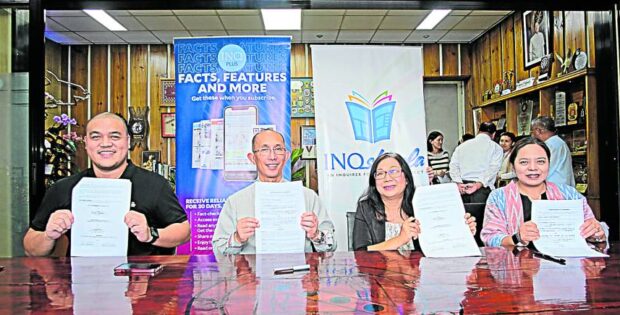Baguio joins INQskwela as school kids’ reading skills improve

‘SMART’ MOVE | Baguio City Mayor Benjamin Magalong (second from left) and Schools Division Superintendent Soraya Faculo (fourth) seal an INQskwela partnership with the Inquirer’s national sales manager Roy Raul Mendiola and assistant vice president Connie Kalagayan at Baguio City Hall on July 12, 2023. (Photo by NEIL CLARK ONGCHANGCO / Philippine Daily Inquirer)
BAGUIO CITY, Benguet, Philippines — The summer capital has officially joined the Philippine Daily Inquirer’s (PDI) INQskwela project following the approval of the local school board and in line with Baguio’s aspirations to become a smart city through the increasing use of digital automation in public services and socioeconomic activities.
Twenty pilot schools are getting free access to the digital edition of the newspaper, using the InquirerPlus app, as part of the Inquirer Foundation’s campaign to instill the love of reading among schoolchildren, develop their interest in current events and civic duty, and give them an early start in media literacy.
Baguio is the fifth local government to partner with PDI and the Inquirer Foundation since INQskwela was relaunched last year after the pandemic pause.
Earlier partners included Valenzuela City, Manila, San Manuel town in Tarlac province, and Victorias City in Negros Occidental.
Tomorrow, the local government of Calumpit, Bulacan, is also expected to sign up as a partner.
Article continues after this advertisement“I have been speaking to students lately and I realized that they have not been able to grasp the relevance of current events and everything that is happening in the country,” said Mayor Benjamin Magalong following the signing a memorandum of agreement (MOA) between the city government and Inquirer Foundation on July 12.
Article continues after this advertisementThrough class discussions about the day’s news and issues, he said, “The students can determine: ‘What is our role as young individuals?’”
Hopefully, he said, the students would realize that being young should not prevent them from speaking out and doing what they can to help solve Baguio’s problems.
Information obtained from credible news sources can “empower them and make them better leaders” in the future, Magalong added.
Smart classrooms
Once classes resume on Aug. 27, Baguio teachers may incorporate news reports in InquirerPlus as part of the day’s lessons, particularly in social studies, the mayor added.
Representing the Inquirer at the MOA signing was Connie Kalagayan, assistant vice president for corporate affairs and the foundation’s executive director.
The INQskwela partnership is expected to complement Baguio’s “Smart Learning Communities (SLC)” program, which encourages teachers to use various technological innovations to enhance their students’ learning experience, according to Soraya Faculo, Baguio City Schools Division superintendent.
The goal is for the city to have more “smart classrooms,” Faculo said, with the training of teachers in 15 pilot elementary and high schools. (The division oversees some 60,000 pupils in 45 grade schools and 21 high schools across Baguio.)
SLC is being implemented from 2023 to 2026, during which the pilot schools are expected to “maximize online learning” in the first school year and generate data that the Department of Education (DepEd) can use to design a “model” smart classroom for Baguio.
The DepEd will then purchase the needed equipment when it applies that model to half of the city’s grade schools in the second year of SLC. In the third year, all Baguio schools should be covered by the program.
The city is also acquiring additional internet bandwidth of up to 10 gigabytes from the National Broadband Program to improve connectivity for all schools, Magalong also said.
Reading skills
Like many Filipino children, Baguio pupils initially struggled but have since adapted to blended learning, which became the norm during the pandemic lockdown.
Faculo cited the results of the Philippine Informal Reading Inventory (Phil-IRI) for the school year 2022-2023 showing that 41.78 percent (4,060) of 9,716 Baguio students in Grades 4-6 could read English text “independently,” meaning they did not require help from teachers.
Of the 4,563 Grade 7 pupils who were tested, 42.01 percent (1,917) proved to be “independent” readers of English text, the education official said in a recent report to Magalong.
Introduced in 2018 by then Education Secretary Leonor Briones, Phil-IRI is a diagnostic tool that measures pupils’ reading skills in English and Filipino before and after a school term.
Given these developments, INQskwela could help in the Baguio schools’ transition to a community of smart classrooms, the mayor said.